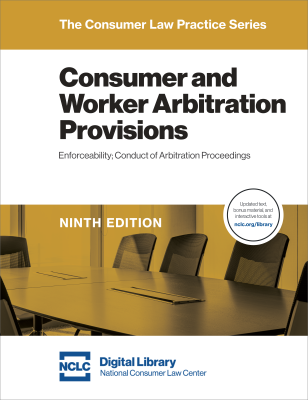A Mississippi federal court on November 7th preliminarily enjoined the November 28 effective date of a new rule banning arbitration requirements in nursing home agreements. On September 29, 2016, Department of Health and Human Services’ Center for Medicare and Medicaid Services (CMS) announced the new rule covering a wide range of subjects. One important provision, 42 C.F.R. § 483.70(n), cuts off Medicare and Medicaid funding to nursing homes and other long-term care facilities that enter into pre-dispute arbitration agreements with their residents. While the rule’s provisions will be implemented in three stages, the arbitration provision was to have been effective for any new agreement entered into starting November 28, 2016.
The court in American Health Care Association v. Burwell (N.D. Miss. Nov. 7, 2016) issued a preliminary injunction against the rule’s implementation. The judge found arbitration in nursing home agreements troubling, but was more concerned with the “incremental ‘creep’ of federal agency authority beyond that envisioned by the U.S. Constitution.” The court found there to be a likelihood of success on the merits for the plaintiffs, that the plaintiffs would suffer irreparable injury if the rule went into effect, injury outweighing any harm from the injunction, and that the preliminary injunction would be in the public interest.
Since this is just a preliminary injunction from a trial court, the rule may yet go into effect, but almost certainly not by November 28. If the rule is delayed for a lengthy period or never goes into effect, there is still extensive case law limiting the enforceability of nursing home arbitration agreements, including whether residents or their families are bound to the agreements signed on admission. This case law, examined at NCLC’s Consumer Arbitration Agreements § 7.6.4, is unaffected by the preliminary injunction. In fact, the decision is highly critical of nursing home arbitration, and may in fact be used to support other types of challenges to nursing home arbitration agreements.
The Rule’s Description The final rule announced on September 29 is much stronger than CMS’s proposed rule that would have prohibited arbitration agreements only as a condition of admission, but would have allowed nursing homes to enter into arbitration agreements outside of the admission process. After receiving comments, CMS expanded the rule to prohibit any pre-dispute arbitration agreements between nursing homes and their residents. Under the final rule, facilities are allowed to enter into arbitration agreements with residents only with respect to disputes that have already arisen, and then with certain restrictions. Facilities cannot, for example, require residents to enter into arbitration agreements as a condition of remaining within the facility. Facilities must retain signed copies of any arbitration agreement for CMS review.
Authority to Issue the Rule Despite the Mississippi court’s ruling, CMS has strong arguments why the rule is within its authority. The Federal Arbitration Act (FAA) deals with enforcement of existing arbitration agreements, not with the circumstances under which parties can enter into arbitration agreements. Because the rule does not cover pre-existing arbitration agreements, it does not implicate the FAA. The CMS also has authority to require providers to forgo certain rights they might otherwise have as a condition of participating in the Medicare and Medicaid programs. In addition, the use and enforcement of arbitration agreements undermines the agency’s ability to ensure that federal funds are being spent on services that adequately serve Medicaid and Medicare patients. The CMS thus has the authority to issue the rule under its “market participant” authority. See NCLC’s Model State Consumer and Employee Justice Enforcement Act for a discussion of this market participant authority.
CMS Rule Is One of Nine Significant Federal Actions Limiting Arbitration Requirements
- The Truth in Lending Act, effective June 1, 2013, prohibits mortgage loans containing arbitration agreements. See Consumer Arbitration Agreements § 4.2.2.1. The same prohibition applies to manufactured home loans and other loans related to a dwelling.
- The CFPB in May of 2016 proposed a rule that prohibits covered providers from using arbitration agreements to prevent consumers from bringing class actions in court. The comment period ended in August, and the rule is likely to apply to any agreement entered into 211 days after the rule's publication in the Federal Register. Id. § 4.2.4.
- The Talent Nelson Military Lending Act prohibits creditors from including or enforcing arbitration agreements in certain consumer credit contracts extended to active duty military personnel or their dependents. 10 U.S.C. § 987(f)(4). Effective October 3, 2016, a Department of Defense rule expands the scope of this provision to include almost all closed-end credit other than purchase money credit. See NCLC Consumer Arbitration Agreements § 4.2.3.
- The Magnuson-Moss Warranty Act allows warrantors to require that consumers first resort to non-binding informal dispute resolution mechanisms to resolve their written warranty claims. 15 U.S.C. § 2310(a)(3). In May 2015, the FTC reaffirmed its long-held view that warrantors cannot rely on binding arbitration to resolve warranty claims, despite earlier court decisions that had disapproved of this FTC position. Id § 4.3.2.
- The Department of Education, on November 1, 2016, finalized a rule limiting the ability of schools that receive federal student loan funds from enforcing arbitration requirements, even for existing agreements. See New Defenses to Student Loan Repayment Based on School Misconduct and Closures
- The National Labor Relations Board announced in In Re D. R. Horton, Inc., 357 NLRB 2277, 2286-87 (2012) that the National Labor Relations Act prohibits the use and enforcement of class waivers (whether or not in arbitration clauses) in agreements between employees and employers. This ruling recently has been approved by the Seventh and Ninth circuits, but disapproved several years ago by the Second, Fifth and Eighth circuits. See Morris v. Ernst & Young, LLP, 2016 WL 4433080 (9th Cir. Aug. 22, 2016) (approving); Lewis v. Epic Sys. Corp., 823 F.3d 1147 (7th Cir. 2016) (same); but see Owen v. Bristol Care, Inc., 702 F.3d 1050 (8th Cir. 2013); Sutherland v. Ernst & Young LLP, 726 F.3d 290 (2d Cir. 2013); D.R. Horton, Inc. v. N.L.R.B., 737 F.3d 344 (5th Cir. 2013).
- The Department of Labor on April 8, 2016 issued a rule allowing plaintiffs to file class actions in court to enforce its rule imposing fiduciary duties on investment advisers who serve ERISA plans and clients with personal retirement accounts. See 81 FR 20945 (April 8, 2016).
- The Fair Pay and Safe Workplaces Executive Order of July 31, 2014 prohibits pre-dispute, binding arbitration agreements covering discrimination, assault, and sexual harassment claims in contracts between large federal contractors and their employees. The Executive Order broadly covers all of these contractors’ employment agreements, even those with employees who do not work on federal contracts. See NCLC Consumer Arbitration Agreements 4.2.5.
We welcome links to this page. For non-commercial purposes, you also have permission to reproduce this page digitally or in print without changes by adding the following language "Reprinted with permission from National Consumer Law Center, www.nclc.org/library."


